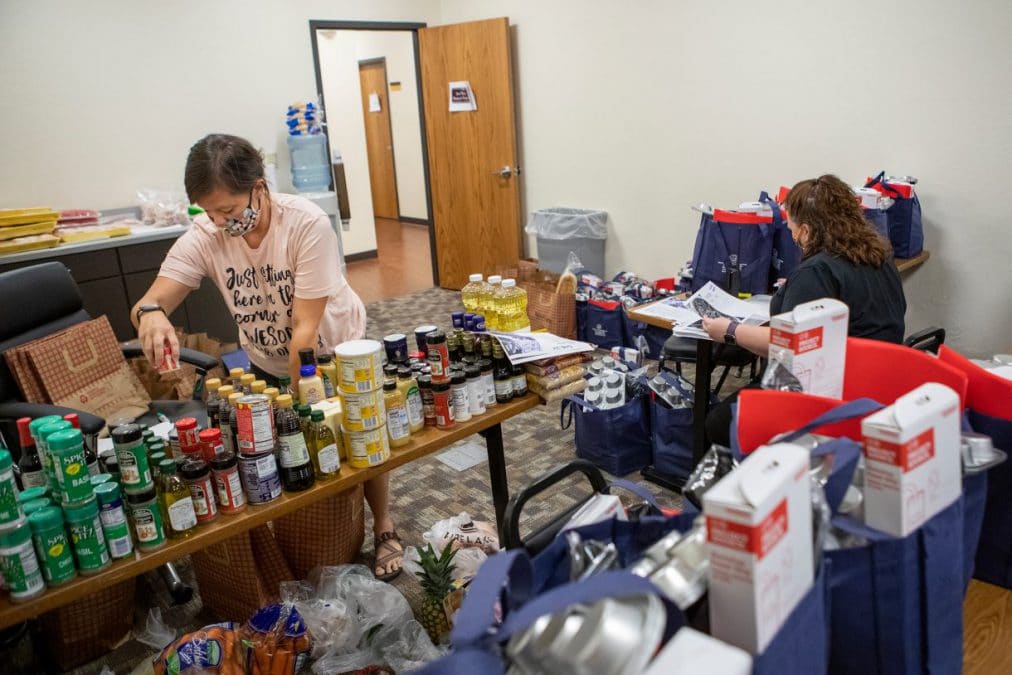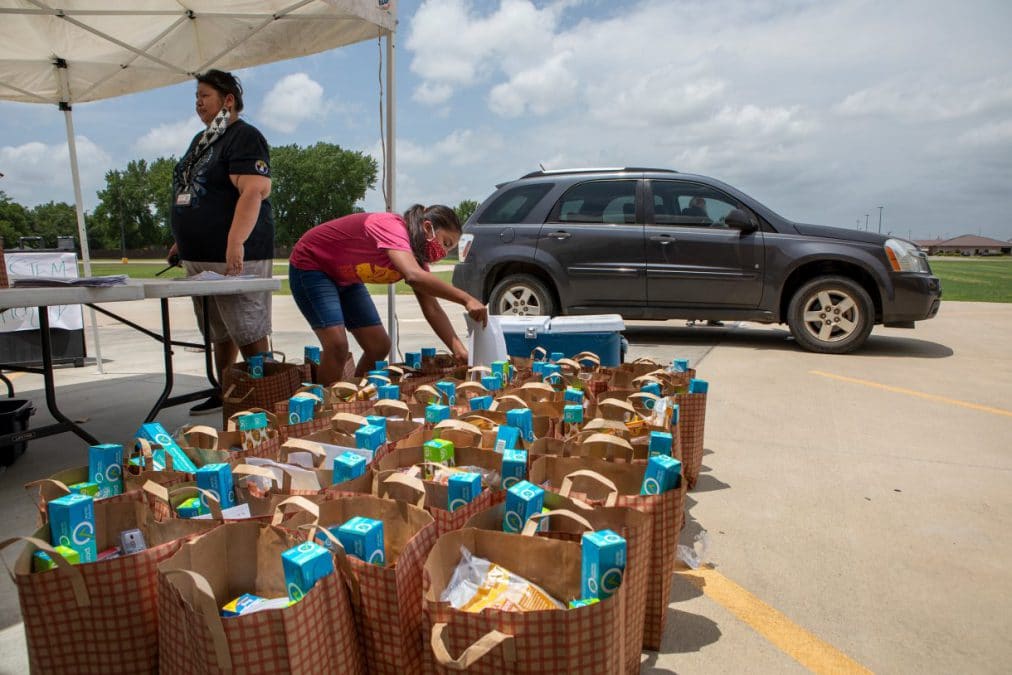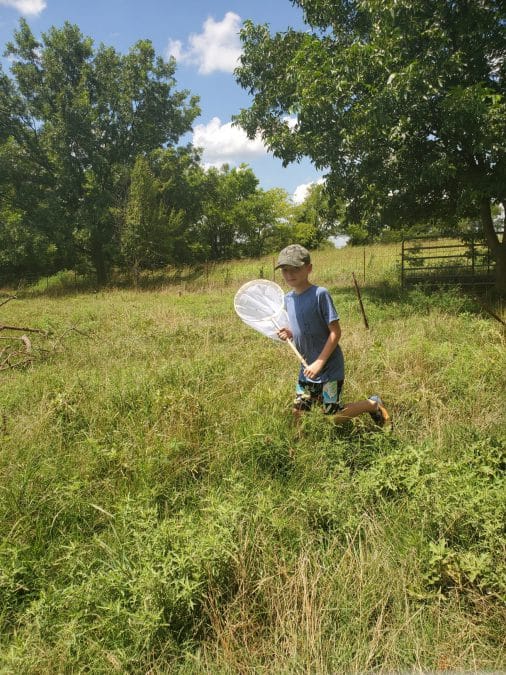The coronavirus pandemic forced departments across the Citizen Potawatomi Nation to employ ingenuity to continue meeting their missions. As in-person summer programs were canceled, several CPN departments, including Workforce Development & Social Services and the Department of Education, partnered with Oklahoma State University and employees across CPN to develop two virtual camps held July 20 through July 25.
During the week, students attended virtual Healthy Eats and STEM camps. Participants joined mid-morning Zoom cooking classes organized by CPN Dietitian Maggi Gilbert and Workforce Development & Social Services, and school-age children across CPN’s service area had an opportunity to learn from science, technology, engineering and math professionals.

“It is so rewarding to provide information that I have — resources that I have – to these Native youth,” said Dr. Kent Smith, VSTEM presenter, professor at Oklahoma State University College of Osteopathic Medicine and associate dean of the Office of American Indian in Medicine and Science. “If a handful of them grab it and do something with it, then I have succeeded.”
Organizing
Every summer, Workforce Development & Social Services awards stipends for youth clients to attend summer camps. However, due to the pandemic, CPN staff began discussing virtual options in early June. Around the same time, Dr. Kent Smith from OSU reached out to the CPN Department of Education Director Tesia Zientek about a potential partnership.
“Each of our departments typically offers summer programs for youth, but with COVID-19, we have had to be adaptable and innovative,” Tesia said. “This seemed like a wonderful solution, and it bloomed into something beyond what Dr. Smith had originally explained when we brought on other STEM experts.”
The week focused on developing important life skills like healthy eating and exercise as well as introduced participants to STEM careers in a fun, engaging way. Removing barriers to partaking in both camps was important to organizers.
A few days before, students received supply boxes with all the items necessary to participate, including exercise equipment, an indoor grill, science-program supplies, a first aid kit and more.
Staff took the time to think about every aspect of the camps when purchasing materials.
“Some of the activities encouraged the kids to go outside, so we included bug spray and sunscreen,” said CPN Workforce Development & Social Services Assistant Director Margaret Zientek.
Many families told organizers they did not expect the amount of supplies they received.
“The kids’ faces and the parents’ faces — there were definitely some tears,” said Kym Coe, CPN Workforce Development & Social Services youth counselor.
Healthy Eats

Every morning, participants and their guardians joined Tribal dietitian Maggi Gilbert via Zoom as she taught recipes and discussed healthy eating. Throughout the camp, they prepared egg breakfast cups, turkey rollups, chicken kabobs, Mexican pizza and peanut butter energy bites.
“I was shocked at the number,” Gilbert said. “I couldn’t believe there were that many people on the Zoom meetings.”
Staff tried to make every part of the experience educational for the more than 40 participants, even down to how to buy groceries for the week’s lessons.
“We had planned to bring them and to go shopping with them, but what we ended up having them do is they had to log on to firelakefoods.com. They had to literally go through the shopping experience and put the ingredients they needed into the shopping cart,” Margaret said.
Since becoming a dietitian, Gilbert has noticed how prevalent convenience, fast foods are in American diets, and she tailored her sessions to help students make better decisions post-camp.
“My hope is that they would speak up and say, ‘We’re missing a vegetable,’ or ‘Hey mom, could we maybe try this? I had it at this camp, and it was really good.’ So, just opening their eyes to new things,” she said.
“And I also feel there’s a lot of value in teaching that it doesn’t have to always be fruit, vegetable, whole grain. We can incorporate some fun foods too and that it’s not strict rules for healthy eating.”
To encourage attendees to continue exploring healthy eating after the week ended, Gilbert created a cookbook that included easy to prepare dishes.
“I took some time to research different recipes that I thought would be healthy and nutritious but also fun for kids, then I just kind of pieced that together,” she said.
While she missed the in-person interaction, Gilbert appreciated that her sessions brought families together for an educational, fun activity.
“My favorite part was honestly the cooking and exercising,” said Robert Collins II, CPN member and participant. His father joined along, and although they do not normally prepare meals together, they enjoyed the experience.
VSTEM

In the afternoons, instructors led Zoom lessons on a variety of subjects. Programming included exercise instruction from FireLake Wellness Center trainers; OSU Associate Professor Jennifer Volberding, Ph.D. discussed athletic training and health-related career opportunities; CPN Environmental Specialist Lexi Freeman talked about the importance of a balanced ecology and basic entomology; and Dr. Smith presented on Indigenous health as well as archaeology and fossils.
“We certainly had to be creative on how to get students involved in a virtual format,” Tesia said. “The STEM kits helped tremendously with this.”
Staff included supplies for each class to encourage contribution. The interactive presentations lasted an hour and a half, then CPN Department of Education staff spent the last 30 minutes each day discussing career and higher-educational opportunities.
“We intended that the VSTEM camp not only exposed students to different STEM fields but also got them thinking on how to prepare for college and careers in those particular fields or any (fields) that might interest them,” Tesia said.
Highlighting the opportunities within CPN and other tribes was also important, and internal experts introduced the youth to the vast career options across Indian Country. Freeman studies water quality on CPN land for the Tribe’s department of environmental health. With a Master’s in Environmental Science, she taught the students about entomology and easy ways to research the world around them.
“They got a collection kit with a net, magnifying class and a little box,” Freeman said. “That’s what really got me into it. You catch something, and it doesn’t look like a lot. Then you have a whole box full of insect, and it’s like, ‘Wow, I did that?’”
In her youth, she often attended a variety of camps during the summer. As a CPN tribal member, she is thankful for her part in providing participants similar experiences.
“Considering the Seven Generations, I think having advocacy from us important,” Freeman said. “I would hope that even if I can just get one kid interested and they end up working for the (Department of Environmental Quality) or (Environmental Protection Agency), giving that perspective, that’s important.”
At the end of each day, participants submitted feedback on the camps and variety of subjects covered.
One student said, “My biggest takeaway today was learning how to properly identify and preserve bugs. Before today, I did not know how to preserve bugs correctly. I really enjoyed learning more in depth about entomology. My great-grandfather was an entomologist. I think that it is an interesting field, and I cannot wait to get out and identify and study some of the bugs in my area.”
Although this was the Nation’s first time experimenting with virtual youth programming, the week was successful for students and presenters alike.
“This is absolutely something we will consider as the pandemic continues,” Tesia said. “It may also be something we look at to expand some of our programming beyond the immediate area so that non-local CPN students can participate.”
To learn more about the camps and access the Zoom presentations, visit cpn.news/vcamp.
